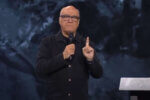Pastor says city bureaucracy has quashed his request to construct what would be capital’s first Spirit-filled church
A five-year struggle by one of Moscow’s largest Pentecostal congregations to build what would be the Russian capital’s first Spirit-filled church is coming to a head as city officials refuse to allow the project to proceed.
At stake is an estimated $200,000 collected from congregants in the 1,000-member Immanuel Church, said pastor Alexander Purshaga. He remains determined to build on the site in southwest Moscow first designated by the city.
“We don’t have the money to go through this project again. People donated their family valuables to make this possible,” said Purshaga, 35, whose church is a member of the government-recognized Russian Assemblies of God. “What they are doing is entirely against the law and violates the rights of believers.”
Purshaga and other leaders of the Immanuel Church claim that a decision in November by the Moscow Land Committee to forbid construction is rooted in anti-Protestant sentiment among politicians in Moscow, home to the country’s dominant Russian Orthodox Church.
“It is not very popular to help Protestants in Russia. If we were Orthodox, we would have built this church a long time ago,” Purshaga said. Dozens of new Russian Orthodox churches have sprung up in Moscow neighborhoods in the last decade.
Protestants make up less than 1 percent of Russia’s 143 million citizens, although their numbers have grown steadily with the fall of the atheistic Soviet Union. They often are associated with Western values and missionaries. No matter how hostile public opinion or the Russian Orthodox Church may be, the Immanuel Church has the legal right to construct a church and move out of rented property.
Purshaga said Immanuel’s leaders have patiently complied with the city’s land-use requirements. They have remained confident that they would eventually win final permission to start construction in a scraggly park conveniently located near a station of Moscow’s “metro,” the most popular form of transportation in the city of
10 million.
“In 1996 the government suggested a place for us near Metro Prospekt Vernadskogo,” he said. “They told us we just needed to go through all the bureaucratic hoops. Three times we changed the project, and each time we had to pay more.”
After being told that neighborhood residents were against the proposed church, Immanuel’s members canvassed the area to gauge public opinion. They reported that of 10,000 people queried, 6,392 were in favor of the construction project. Nevertheless, the city’s Land Committee told Immanuel to look for another site.
Frustrated by the decision, Purshaga said he plans to take the city to court in hopes a judge will force it to honor its original commitment. Chances of that happening may be slim. A series of recent Moscow city-court decisions denied the Salvation Army permission to register as a religious organization because of suspicions that it was a paramilitary group threatening Russia’s national security. Still, Purshaga is optimistic.
“We are praying to God for help. I think we will win. If the judge is fair, then we will win,” he said.
Elsewhere, the St. Petersburg-based leaders of the charismatic Association of Christian Churches in Russia (ACCR) are reporting significant progress with humanitarian aid from once-obstructive Russian-government officials.
ACCR Vice President Andrei Bolshakov met, along with the group’s president, pastor Igor Nikitin, with the powerful executive secretary of the Russian government’s Commission of Humanitarian Aid in Moscow on Nov. 30 to address a burdensome tax on imported humanitarian aid, among other issues.
More recently, in February, ACCR officials met with a federal government official and requested he re-word a proposed law that has the potential to grant the Orthodox Church more legal favors over Pentecostals and other groups.
The Nov. 30 meeting was especially important because Alexander Novikov had publicly stated his opposition to Protestant churches’ involvement in the distribution of foreign aid.
“It seemed to him that the main goal was to lure people away from the Orthodox Church,” Bolshakov said.
Bolshakov, 42, said he felt confident after the two-hour meeting that the ACCR would no longer be subject to a loathsome 33-percent tax on all imported humanitarian aid and that it would be allowed to work outside of its St. Petersburg base.
“We had practically stopped accepting any humanitarian aid because of these conditions,” Bolshakov said, adding that the ACCR’s last aid distribution occurred in late 1999.
With a green light from the Russian government, Bolshakov said he is confident the ACCR will be in a position to assist people with food, clothing and construction material. Churches in Germany, Sweden and Finland are eager to help, he said.
“There are huge amounts of aid in [shipping] containers just waiting for a place to go,” he noted.
On Feb. 19, Nikitin and other ACCR representatives met in Moscow with State Deputy Alexander Chuev, author of the proposed “Law About Traditional Religions in the Russian Federation,” and appealed the use of the words “traditional religions” in the proposal, which they say would cause discrimination against non-Orthodox believers.
The ACCR has 300 member-churches scattered across Russia from Kaliningrad in the west to Anadyr in the east. According to the latest government statistics, 33 percent of Russians live below the poverty line, defined as a monthly personal income of $44.
Frank Brown in Moscow





Leave a Comment
You must be logged in to post a comment.